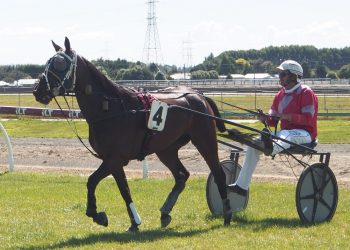Clinton, ON — They once dominated harness racing like Larry Bird and Magic Johnson did basketball and Wayne Gretzky and Mario Lemieux ruled hockey. Now Hall of Famers Bill O’Donnell and John Campbell will both hang up their colors for good after a final drive against each other on July 30 in the C$15,000 Legends Day Trot at Clinton Raceway.
O’Donnell said it was an idea first hatched in Las Vegas in February during the Dan Patch Awards honoring the best in the sport in the United States from the previous year.
“We were down in Vegas for the Dan Patch. John and I and Dave Miller were standing there and John said, ‘Dave’s coming to Legends Day’ and I said, ‘Good, he can take my place. I don’t want to (drive) anymore.’ So John said, ‘Let’s do it together, our last drives,’” O’Donnell said.
Considering O’Donnell has only had a handful of drives in the last five years — most of those for fan events — he said he isn’t bothered by the fact Campbell, who is still driving regularly, is getting most of the attention for making his last drive at Clinton.
“I don’t mind it. I made $98 million on (Campbell’s) coattails,” O’Donnell said, laughing, adding that he’s been trying to officially call it quits for a few years and came close in 2013 after winning the $10,000 Mr. and Mrs. Elbridge Gerry Memorial Trot for Hall of Fame drivers at the Goshen, N.Y. Historic Track that is located behind the Harness Racing Museum & Hall of Fame.
“After I won there that one year I said, ‘That’s it, I’m all done,’ but then they call because they have trouble getting eight guys (for the race). (Museum trustee) Ebby Gerry has called and it’s hard to say no to him, but I’ll break it to him this year (at Goshen) that this is it,” O’Donnell said.
In the 1980s, when the sport was flourishing at the Meadowlands Racetrack in New Jersey and the concept of hired-gun catch-drivers was in its infancy, O’Donnell and Campbell battled at the top of the sport like few drivers had before them and few have since. It was during that era that O’Donnell earned the nickname The Magic Man for his wizardry in the race bike.
“Billy at his best was better than any driver I have ever seen,” Campbell said in 2001, the year Legends Day debuted. Legends Day, which this year is raising money for the Clinton Public Hospital Foundation, has been held every two years since and will celebrate its ninth edition this year. O’Donnell has never missed it.
“It’s just refreshing to see everyone is there for harness racing. These are fans,” O’Donnell said of Legends Day. “It’s a great day. You get to see people you haven’t seen for a long time.”
O’Donnell, 69, has 5,743 career wins and has earned C$99 million on the track. He is one of eight of the world’s greatest harness drivers contesting the Legends Day Trot on the card along with Campbell (11,049 career wins and C$303 million), Ron Waples (6,923 wins, C$75 million), David Miller (12,100 wins, C$215 million), Mike Lachance (10,421, C$190 million), Steve Condren (6,845, C$114 million), Dave Wall (7,200, C$60 million) and Doug Brown (8,427, C$89 million).
Combined, the eight legends have earned more than C$1.15 billion and won nearly 69,000 races.
Fellow legends Bud Fritz and 93-year-old Keith Waples — both of whom are retired from driving — will also be on hand for an autograph session.
O’Donnell said it’s nice the legends get along so well off the track.
“We’ve always been comrades. The racing was competitive on the track, but we all get along, pretty much, in that age group,” O’Donnell said.
O’Donnell was inducted into the U.S. Harness Racing Hall of Fame in 1990 — the same year Campbell was also enshrined in Goshen, N.Y. — Canada’s Sports Hall of Fame in 1992 and the Canadian Horse Racing Hall of Fame in 1996.
He was born in Springhill, Nova Scotia, a mining town of some 5,000 that is also the birthplace of Canada’s “Songbird,” Anne Murray.
O’Donnell’s father, Henry — better known as “Henny” — was a coal miner and a part-time horseman. In 1958, when Bill was 10, the Springhill Mine Disaster claimed the lives of 75 men and led to the closure of the mine. That forced Henny to transfer to a mine in Cape Breton. Though the family moved, they still stayed in the harness racing game.
Bill was exposed to the horses by his father and his uncle, Art Porter, from whom Bill took his blue, orange and white colors.
In the summer of 1965, when he was 17, Bill moved to Toronto and worked as a groom for Ron Feagan. He went home to Nova Scotia for the school year before returning to Toronto in the summer of 1966 to work for Bill Wellwood. In 1967, O’Donnell went back to Nova Scotia, worked there a few years and then headed for New England as an assistant trainer for New Brunswick native and former Legends Day honoree Jim Doherty, who died in 2015.
Bill stayed in New England for seven or eight years before poor purses forced him to pack up and move to Saratoga in New York. Only a few years passed before Bill moved to the Meadowlands in 1980. He stayed for two decades.
The date of Aug. 16, 1984, still stands as Bill’s single greatest day in the business. That morning he set a world record driving trotting filly Fancy Crown at Springfield, Ill. Then Bill hopped on a plane back to Jersey where he won the Woodrow Wilson with Nihilator for a purse of more than $2.16 million, to this day still the richest harness purse in history. To top it off, he also won three of the four sizable Wilson consolation events.
The win with Nihilator is widely considered the key moment harness racing changed from a sport of trainer/drivers to one in which trainers hired catch-drivers better skilled at getting the most out of horses. Legendary horseman Billy Haughton took himself off Nihilator — arguably his greatest horse — because he thought Bill O’Donnell would have more success.
That same year, Bill set a record for driver earnings of $9,059,184. The next year, Bill became the sport’s first $10 million man while driving both Nihilator and 3-year-old champion colt trotter Prakas to single-season money-winning records. Prakas won the Hambletonian. Nihilator was the U.S. Horse of the Year. The brilliant son of Niatross won 23 of 25 starts, capturing every major stake offered and setting a then world record of 1:49.3 at The Meadowlands.
Bill earned the reputation of excelling with trotters, even though he drove the fastest pacer ever — Cambest — in a 1:46.1 time trial in 1993 that stood for 23 years as the sport’s fastest mile until broken by Always Be Miki in 2016.
Among the numerous Horse of the Year or divisional champions that Bill steered to victory are Little Brown Jug and Cane Pace champion Barberry Spur; Governor’s Cup and Presidential Pace winner Redskin; Camtastic, Valley Victory, Sweet Reflection, Cayster, Delinquent Account and Canadian Pacing Derby winners Artsplace and Staying Together, who also won the Breeders Crown.
Bill said fans at Clinton Raceway often ask him about the horses he’s driven and Staying Together, owned by Robert Hamather of nearby Exeter, Ontario, comes up more than most.
Today, Bill lives in Guelph, Ontario and is the president of the Central Ontario Standardbred Association that represents the horsepeople racing on the Woodbine Entertainment Group circuit.
He said he is honored to hang up his colors at Clinton and be there when Campbell does the same.
“I think it will be a big deal,” Bill said. “That’s where John started. That’s his area.”
Clinton Raceway

 USA
USA Canada
Canada Australia
Australia New Zealand
New Zealand Europe
Europe UK / IRE
UK / IRE


